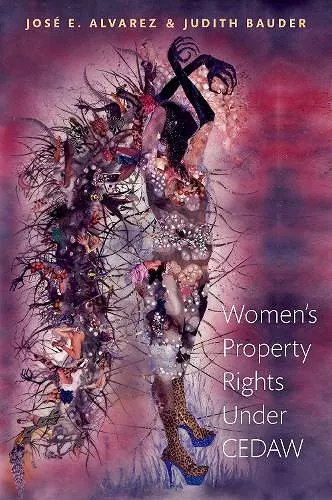Women's Property Rights Under CEDAW
Jose? E A?lvarez author Judith Bauder author
Format:Hardback
Publisher:Oxford University Press Inc
Published:19th Jun '24
£91.00
Supplier delay - available to order, but may take longer than usual.

The gender gap with respect to wealth and property is a chasm. For over 40 years, the leading international treaty body on women's rights, the Committee on the Elimination of All Forms of Discrimination Against Women (the CEDAW Committee), has been generating jurisprudence interpreting CEDAW's obligations that states protect the equal rights of women in relationships; family rights, including inheritance; rights to land, adequate housing, financial credit, social benefits, intellectual property, and other economic rights dependent on equal access to justice. This book uses the CEDAW Committee's own texts: its General Recommendations, Views in response to communications, Concluding Observations in response to State reports, and Reports on Inquiries. The book finds that CEDAW's vision of what it means for women to have equal rights to property is dramatically different from what many scholars consider to be the leading source of "the international law of property," namely the case law generated on behalf of foreign investors' property under the international investment regime. CEDAW's vision is also more far-reaching and nuanced than the gender equality approaches followed by international financial institutions like the World Bank, whose gender equality rhetoric exceeds its actual on-the-ground development efforts. While CEDAW's property rights converge with those protected under other international human rights regimes, they remain unique in addressing the underlying patriarchal structures, stereotypes, and forms of intersectional discrimination that have undermined the fundamental rights of women and girls and led to their continued impoverishment all around the world. This book concludes that CEDAW's re-engendering of property--although a flawed and evolving work in progress--has the potential to be transformative for the half of the planet who is more likely to be treated as property than to have any.
As Special Rapporteur on violence against women I found that one of the main causes of violence against women was women's lack of access to property. Access to property and economic resources protect women from being trapped in abusive environments and inter-personal relationships. This book traces the pioneering work done by CEDAW and other international mechanisms in securing women's right to property. In so doing it interrogates the right to property itself and the creative and distinctive way in which CEDAW promotes and protects this right. This must be compulsory reading for anyone interested in the economic and social wellbeing of women. * Radhika Coomaraswamy, UN Special Rapporteur on Violence Against Women (1994-2003) and former Under-Secretary General and Special Rapporteur on Children and Armed Conflict *
This book is an important contribution to the literature on international property law. Through meticulous scrutiny of the CEDAW property jurisprudence, it transforms constructions of women's property rights. Exhaustively researched and cogently reasoned, it confounds the critics from the left and right, feminist and otherwise. This book provocatively juxtaposes women's property rights under CEDAW with foreign investors' property regimes and human rights treaties. The analysis illuminates legal research and policy paths forward including toward comparative international property law. In reading this study, you will learn how human rights, property law, family law, social benefits law, foreign investment law, and international institutions interact and could interact more productively to ensure women's equal access to the various components of landed, material and other legal forms of property. * Rebecca J. Cook, Professor of Law Emerita, University of Toronto (Canada) *
ISBN: 9780197751879
Dimensions: 155mm x 231mm x 36mm
Weight: 748g
432 pages